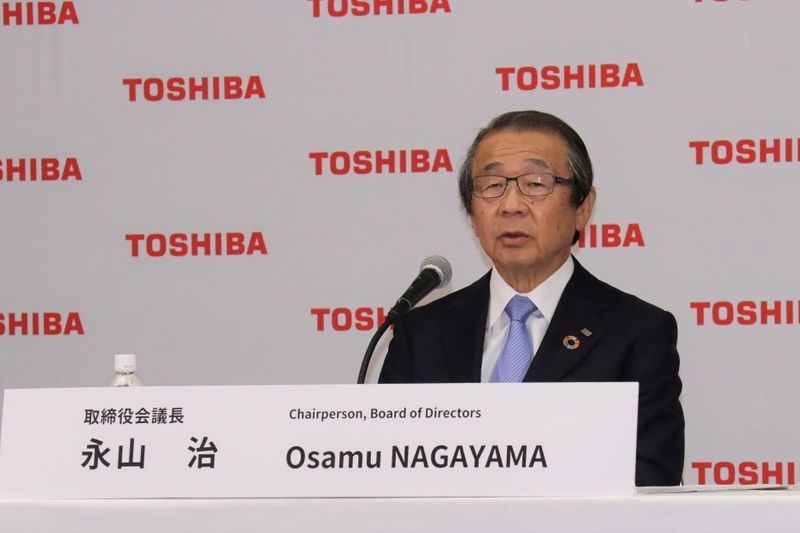By Makiko Yamazaki
TOKYO (Reuters) - Toshiba (OTC:TOSYY) Corp's former board chairman lost his bid for re-election last week with 56% of votes cast against him, according to a breakdown of the results that marked a watershed moment for corporate governance in Japan.
The ouster of Osamu Nagayama follows an explosive independent investigation released this month that found Toshiba colluded with the trade ministry to block foreign shareholders from gaining influence at last year's annual general meeting.
Voting participation at this year's AGM was particularly high, exceeding 80% for the first time since 2010 when new disclosure rules were introduced. There were few abstentions, with votes in favour at 43.7%.
"Overseas investors who usually don't vote participated this time and voted against Nagayama, while some domestic investors also voted against him," said a Toshiba source, who was not authorised to speak on the matter and declined to be identified.
Nagayama only joined Toshiba's board in mid-2020 but critics argued he had to take responsibility for the board's resistance to address the allegations that overseas investors had been pressured.
Shareholder advisory firms Institutional Shareholder Services Inc and Glass Lewis had recommended against his reappointment.
But Nagayama's failure to win re-election has only fanned concerns of a leadership vacuum at Toshiba, which has lurched from crisis to crisis since an accounting scandal in 2015.
"Growing management upheaval at Toshiba is increasingly likely to hurt its operating and financial performance," S&P Global (NYSE:SPGI) Ratings said in a report on Monday.
CEO Satoshi Tsunakawa was appointed as interim chairman. Tsunakawa retook the CEO position in April after Toshiba's previous chief executive left, but Tsunakawa has said he does not plan to stay for too long.
New leadership at Toshiba will have to grapple with selecting a replacement for Tsunakawa as well as new board members that will satisfy its vocal activist shareholders.
It will also have to conduct a strategic review that has been promised in the wake of a $20 billion bid - which Toshiba has dismissed - from private equity firm CVC Capital Partners.

At the same time, it must navigate its relationship with the government which sees the maker of defence equipment and nuclear reactors as strategically important and which reports have said is considering new laws to make sure control over key technology remains within Japan.
Toshiba had initially put forward 13 nominees for the board. It withdrew two after the release of the investigators' report. Friday's AGM saw Nagayama and one other director voted out while another, a confidante of Nagayama, resigned leaving Toshiba with eight newly elected directors.